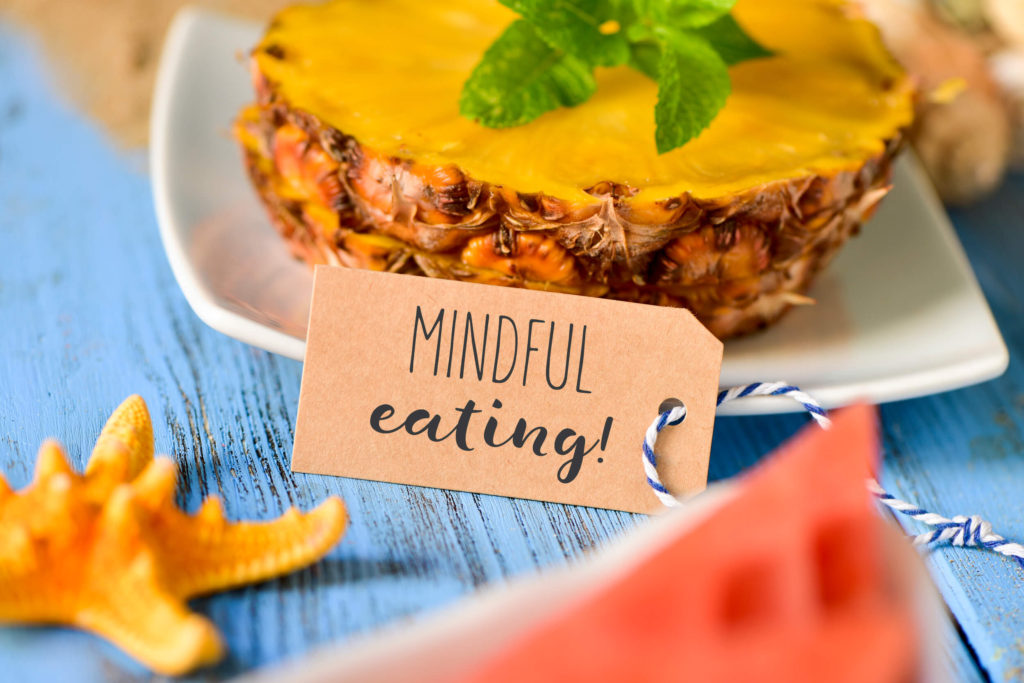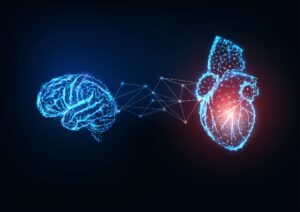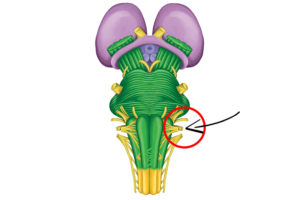A lot of us think that what we ingest into our bodies is the main component in helping us thrive in health. Yet there’s an ancient practice that’s now being rediscovered which puts the primary focus on how we eat.

In Hungry for Change? Compassionate Eating Explored we spoke about how mindful eating centers around creating a peaceful space and conscious actions during mealtimes, and we outlined the benefits of eating with virtue in order to spread compassion, justice, and respect.
Mindful eating is also a powerful practice that extends to another aspect of our life: it helps boost our wellbeing by allowing for the proper digestion of nutrients to take place.
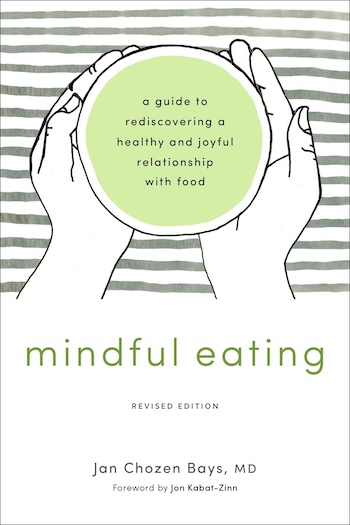
The reason this works so well in upgrading our health is twofold. First, our digestive system responds to stress by creating a condition known as inflammation. Inflammation is an immune system response meant to fight off foreign invaders. But it is also triggered by cortisol released during stressful situations, such as noisy, distracting environments during mealtimes. Chronic inflammation is one of the leading causes of many debilitating diseases including diabetes, cardiovascular disease, and cancer.
Mindful eating’s focus on a serene experience at mealtimes helps us reduce our risk for stress-induced diseases. It also helps realign our actions with our digestive tract’s optimal needs. Many of our current mindless eating practices lead to overtaxing of the digestive system, causing crucial components in our gut to wear down over time so that the uptake of nutrients isn’t as efficient. Proper eating techniques help alleviate the spread of toxins throughout our body by ensuring that enzymes are able to process our food properly.
MINDFUL EATING STRATEGIES
So many of us are not taught the delicate nature of digestion, yet it is truly a dance that involves many interconnected pieces of choreography. The good news is that there are a number of simple moves we can make to ensure that our food has a delicious environment in which to spread its nutritional gifts.
Hara Hachi Bu
This Japanese phrase roughly translates into “eat until you are 80% full”. It’s a technique practiced by some of the longest-living people in the world, including those who reside on the island of Okinawa, Japan. The reason this is so effective is that scientifically speaking, our stomach takes about 20 minutes to signal our brain that it is full. Stopping a little bit before we feel full therefore allows our brain the time it needs to get the message that we are actually fully satiated.
Chew Your Food Well
This works for two reasons: it separates the fiber from the nutrient-rich sections of our food and also increases the surface area of the pieces so that enzymes can more efficiently break food down.
Play Soothing Music
This is especially effective if we must eat in a noisy work cafeteria or on the run in the car. Putting in earbuds or playing serene music on the car stereo helps relax us even if we have to be on the go after a meal. Music has been scientifically proven to decrease the time it takes us to regain balance after stressful situations – such as the work-a-day world. It is particularly beneficial to choose tunes that align with our brain’s serene and conscious alpha wave state of 8-14 hertz per second.
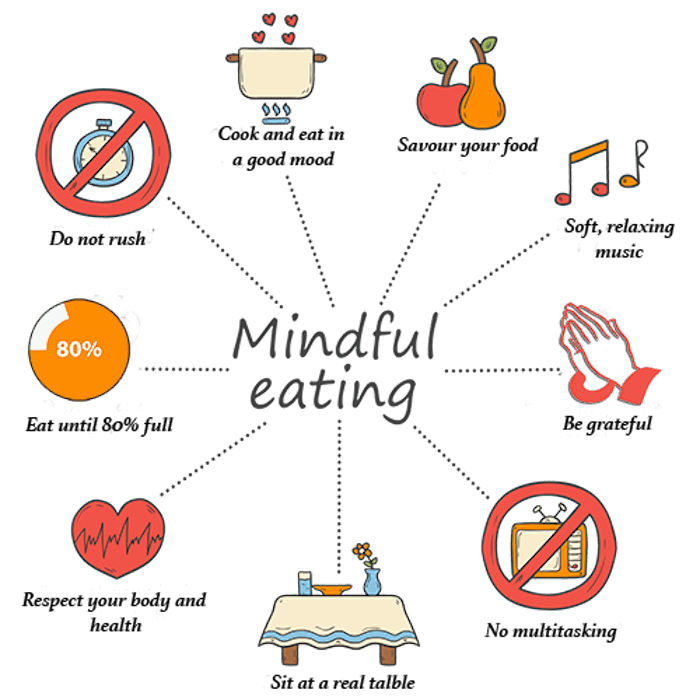
Pay Attention to Your 5 Senses
What does the smell of your food evoke for you? Do you enjoy its bright color? How does the texture feel in your mouth? Thinking about food in this way allows us to determine if what we’re eating is actually enjoyable to us, or if we’re actually not that into it. It also is a strategy to help us slow down enough to be present and take delight in our meal.
Practice Gratitude
We all spend a lot of time focusing on fat, calories, protein content, and numerous pros and cons of our food. Yet how often do we focus on the fact that it is fueling us to get us through that next work meeting, or providing us with the energy boost we needed to deal with “the hangries”? Thanking our food helps us remember why we eat in the first place and refocuses us back on the kinds of positive thoughts that help reduce stress.
Take Time To Rest After Meals
You might remember being told as a child to wait an hour after eating before going swimming. This sage advice is actually based on the science of digestion: it takes several hours to complete a cycle. Movement too soon causes the digestive vessels to constrict, limiting the absorption of nutrients. Today, it is generally recommended to rest for about 15-30 minutes after reaching Hara Hachi Bu.
TOP 3 BENEFITS OF MINDFUL EATING
Weight Loss
Because of the focus on stopping before feeling full, mindfulness helps us shed unwanted pounds. The increased uptake of nutrients also aids in reducing cravings, while the stress reduction which comes with more peaceful meals helps us avoid binge eating.
Lowered Risk of Disease
Studies of conscious eating have found that it provides long-term benefits that go beyond weight loss. In fact, the risk for heart disease and type 2 diabetes are significantly lower, and anxiety and depression decrease when mindfulness is practiced.
A Healthier Relationship with Food
In several studies, including one conducted by researchers at Indiana State and Duke Universities, people who practiced mindful eating began to enjoy their food more, rather than having a contentious relationship with it. This switch in mindset allows for a much more stress-free life filled with delicious and nutritious eats that give us the uplifting energy we need to propel our health forward.
YOU MAY ALSO LIKE:
HEART AND BRAIN SCIENCE TO MAKE NEW YEAR’S RESOLUTIONS FUN AND SUCCESSFUL
“The secret of change is to focus all of your energy, not on fighting the old, but on building the new.” …
THE HEALING VAGABOND: VAGUS NERVE BASICS
One of the most wonderfully mysterious structures in the human body is the Vagus nerve. Within its community of cranial nerves,…
THE HEALING POWER OF MUSHROOMS
“Traditionally valued for their health benefits as well as their nutritional value, modern research is now confirming the therapeutic properties of…
HOW TO USE ESSENTIAL OILS
According to the National Association for Holistic Aromatherapy (NAHA) aromatherapy can assist in balancing our physical, emotional, mental and spiritual health….
WHAT IS GUA SHA TREATMENT GOOD FOR?
Have you ever unwillingly had your body serve as the host for nasty chest congestion that does not seem to go…
THE HEART’S INTELLIGENCE: NEW BREAKTHROUGHS IN MIND-BODY HEALTH
There’s a scene in the inspirational movie I Am in which famed comedic director Tom Shadyac shows up at the HeartMath…

